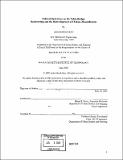Political rush hour on the Tobin Bridge : receivership and the redevelopment of Chelsea, Massachusetts
Author(s)
Ghosh Rao, Asha, 1973-
DownloadFull printable version (11.72Mb)
Other Contributors
Massachusetts Institute of Technology. Dept. of Urban Studies and Planning.
Advisor
Diane E. Davis.
Terms of use
Metadata
Show full item recordAbstract
In September 1991, the Massachusetts State Legislature passed an Act that placed the city of Chelsea, Massachusetts under state receivership. Though the State justified receivership as a response to the City's bankruptcy, they acknowledged that the fiscal problems could not be solved without overcoming a corrupt local political structure. A staff of state-appointed receivers took control of the City for an ensuing five-year period with the charge of regaining fiscal solvency and writing a new city charter. During this time, the receivers initiated a consensus process with the residents to engage them in rewriting their city charter. The receivers were offering a unique opportunity for a state intervention to facilitate a local bottom up process to consider new possibilities for a local government structure. This held the potential to institutionalize greater public participation in local governance and redevelopment. However, I argue that the receivership primarily facilitated metropolitan planning agendas at the expense of public participation in local planning. Chelsea, less than two miles from both downtown Boston and the Logan International Airport, is geographically critical to metropolitan growth and transportation planning. In Chelsea, the tensions between local and metropolitan planning are critical. Given the City's value in the Boston metropolitan area, a significant portion of Chelsea's land is allocated to uses that serve metropolitan needs. The formulation of planning processes that allow the local community to reconcile their demands with the metropolitan authorities remains critical. In this thesis I explore the receivership and redevelopment of Chelsea, Massachusetts, during the early 1990's. I consider the similarities between the "reform" of Chelsea and the reforms advocated during the Progressive Era (1890-1920). I turn to the literature regarding the Progressive movement to understand the implications of the reform initiatives on planning outcomes. Though academic analyses of the Progressive movement do not offer insight into the planning outcomes of the Progressive Era reforms, an analysis of the reform of Chelsea lends insight into rethinking the Progressive Era. Throughout the chapters, I have placed photographs of Chelsea taken in spring 2002. The titles are not listed with the photographs to allow the reader to reflect freely upon the photographs in relation to the text. The themes and the intention of the photo essay are provided after the conclusion of the thesis.
Description
Thesis (M.C.P.)--Massachusetts Institute of Technology, Dept. of Urban Studies and Planning, 2002. Includes bibliographical references (leaves 113-118).
Date issued
2002Department
Massachusetts Institute of Technology. Department of Urban Studies and PlanningPublisher
Massachusetts Institute of Technology
Keywords
Urban Studies and Planning.